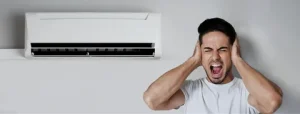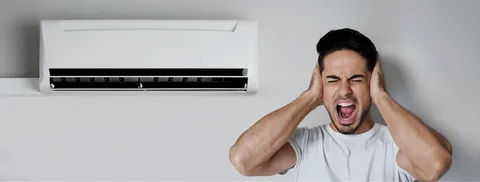| SEO | |
| Meta title | 6 Common AC Noises You Should Never Ignore |
| Meta desc. | Your air conditioning system should run quietly, so any unusual noises like banging, hissing, grinding, buzzing, clicking, or screeching often signal underlying issues that need prompt attention. Read more. |
Your air conditioning unit is supposed to be relatively quiet, so unusual noise means something is wrong. For example, banging or clanking can mean there is a loose or broken part inside the unit, and a refrigerant leak can cause a loud hissing noise. Similarly, grinding is generally indicative of motor trouble, and buzzing requires electrical attention. A thermostat or control might be the problem if the unit makes clicking sounds frequently. Moreover, if the unit begins squealing, it may be due to worn belts or motor bearings. Ignoring these noises can lead to larger issues. So you need to hire an AC system repair service as soon as you hear these noises to prevent the problem from worsening.
Most Common AC Noises
These are some of the most common AC noises:
1: Banging or Clanking
If you ever hear a loud banging or clanking noise in your AC, that’s often a sign that something has come loose or broken within the unit. It could be the blower assembly or a compressor that compresses the refrigerant to cool the air. Other common causes could also be loose faulty bolts or cracked fan blades, leading to inefficient rotation.
It could start as a soft sound and then louder as the component shifts or wears. You should not ignore this noise because it can soon lead to more severe damage. If your unit is banging, shut it off and contact an air conditioning repair technician. The technician can most likely identify the source of the banging and fix the problem before it gets worse.
2: Hissing or Whistling
The high, sharp hissing or whistling noise could indicate a refrigerant leak. Low refrigerant makes the AC work harder than it should, provides less cooling, and requires higher energy consumption, leading to higher energy bills.
The hissing sound might also be caused by air escaping from a crack or gap in the ductwork.. Either way, you shouldn’t attempt to diagnose the cause on your own. A professional can pinpoint the source and fix it properly to restore your system’s efficiency and long-term safety.
3: Grinding
A grinding noise in your air conditioning system is a warning sign for an underlying motor problem. Usually, the bearings within the motor are wearing out, making it difficult for the motor to turn and work efficiently.
If unchecked, it can result in a burned-out motor costing considerably more to replace than it would to fix. You might also notice the unit’s performance decreasing and requiring longer run times. Call an air conditioner repair expert to prevent a complete shutdown of your AC.
4: Buzzing
Buzzing may not sound like a major issue, but it is very serious and indicates an underlying defect. The cause might be a loose wire, a failing capacitor, or a loose refrigerant line causing vibration. Frequent buzzing can indicate debris, such as leaves or sticks, caught on the condenser unit.
Be careful with the electrical circuit, as buzzing can further lead to a short circuit or a fire risk. Do not try to mess with the wires yourself; call an expert to examine the unit for any underlying electrical problems.
5: Clicking
It’s normal for your AC to make a soft click when it turns on or off. But if the clicking continues while the system runs, it needs technical attention. This is due to a failing thermostat, a problem with a relay switch, or poor wiring inside the unit.
This can disrupt the normal on/off cycling of your AC. Your air conditioner might also refuse to boot or overheat. Ask a professional to look into this issue, determine the cause, and fix the clicking sound from your AC.
6: Screeching or Squealing
If it’s making a loud screeching noise, your air conditioner is probably experiencing an issue with the belt or the fan motor. A high-pitched squeal usually indicates that the belt is worn, loose, or slipping. At times, it could also be the motor bearing not being well lubricated. Ignoring this noise can cause additional wear on nearby components. So, get in touch with a trustworthy technician to resolve this issue.
Conclusion
Never ignore odd sounds from your AC, as they might worsen over time. A bang might be due to a loose or broken part, whereas a leaking refrigerant line can lead to hissing. Grinding is due to a malfunctioning motor, and buzzing indicates an issue with loose wiring or connection. Frequent clicking is due to a failing thermostat, and screeching indicates worn-out fan motors. These noises are the warning signs of underlying issues and require you to act rapidly. The sooner you contact a professional AC system repair after hearing a strange noise, the better. Getting the problem fixed now protects your unit from further damage, saves money, and keeps your home cool and comfortable.




